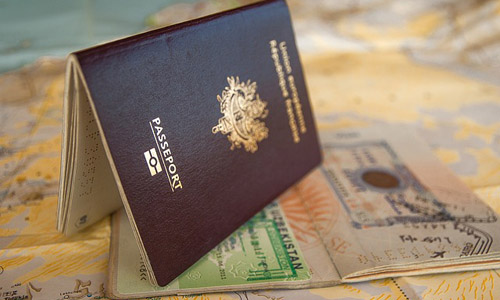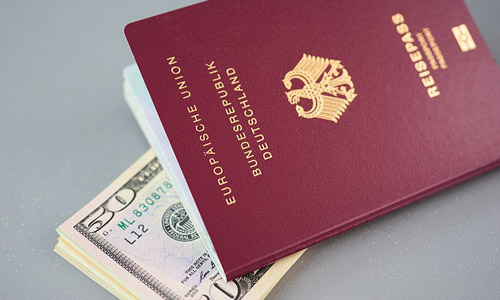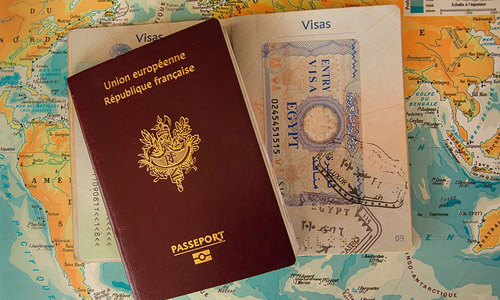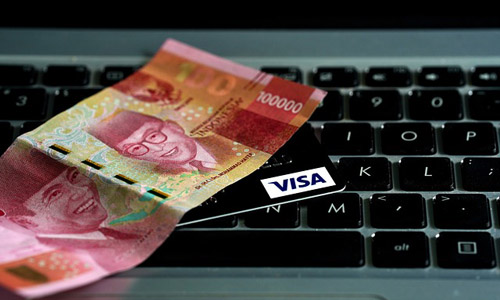Visa Translation Service
All international visa activities rely on visa translation. The importance of visas determines the critical nature of visa translation, making it quite special. Just like the saying “a small error can lead to a huge discrepancy,” even minor translation mistakes can result in severe consequences. Practice has shown that in visa translation, errors often occur in crucial details, such as the applicant’s personal information and visa type, rather than in broader declarative clauses. To ensure accuracy, visa translations often use restrictive structures to clearly define the scope of these key details. Additionally, since many clauses in visa application forms are relatively fixed in their phrasing, the accumulation of experience is also crucial.

Why Choose Us
Best Visa Translator

Visa translation plays a pivotal role in all international visa activities, and its importance cannot be overstated. The critical nature of visa translation stems from the following reasons:
- High Stakes: Visas are essential documents for international travel, immigration, and residency. The accuracy of the information presented in these documents is paramount. Even minor errors in translation can lead to severe consequences, such as visa denials, delays, or legal issues.
more
- Attention to Detail: Visa translation requires meticulous attention to detail. Practice has shown that errors often occur in crucial details, such as the applicant’s personal information, visa type, and other specific data, rather than in broader, more general clauses. These small details are vital for the correct processing of visa applications.
- Precision and Accuracy: To ensure accuracy, visa translations often employ restrictive structures to clearly define the scope of key details. This precision is necessary to avoid misunderstandings and ensure that all information is conveyed correctly.
- Consistency and Experience: Many clauses in visa application forms have relatively fixed phrasing. Therefore, the accumulation of experience in translating these specific terms and phrases is crucial. Experienced translators can ensure consistency and accuracy, reducing the risk of errors.
- Legal and Procedural Compliance: Visa applications must comply with specific legal and procedural requirements of the issuing country. Accurate translation ensures that all legal terms and conditions are correctly interpreted and adhered to, which is essential for the successful approval of the visa.
In conclusion, the importance of visa translation lies in its critical role in ensuring that all details in visa applications are accurately and precisely conveyed. This helps to avoid potential errors and misunderstandings that could lead to serious consequences, ensuring smooth and successful visa processing.
2.Translation Use
Visa translation serves various critical functions in the process of international travel and immigration. Here are the primary uses of visa translation:
- Application Submission: Translating visa application forms and supporting documents into the language required by the destination country’s immigration authorities is essential. This includes personal identification documents, financial statements, employment records, and travel itineraries.
- Legal Documentation: Legal documents such as birth certificates, marriage certificates, police clearance certificates, and educational transcripts often need to be translated to meet visa application requirements.
more
- Interview Preparation: Translating interview questions and preparatory materials helps applicants prepare for visa interviews, ensuring they understand and can respond accurately to questions posed by immigration officers.
- Medical Reports: Medical examinations and health certificates are often required for visa applications, especially for long-term stays or immigration. Accurate translation of medical reports is crucial for meeting health-related entry requirements.
- Employment and Sponsorship Letters: Employment contracts, offer letters, and sponsorship letters need to be translated to demonstrate the applicant’s employment status or financial support in the destination country.
- Financial Documents: Bank statements, proof of income, tax returns, and other financial documents must be translated to show that the applicant meets the financial requirements for the visa.
- Educational Records: For student visas, translating academic transcripts, diplomas, and letters of admission ensures that the applicant’s educational background and intentions are clearly understood.
- Supporting Affidavits: Affidavits or statements from family members or associates supporting the visa application must be accurately translated to provide clear and legally recognized support.
- Immigration History: Records of previous visas, travel history, and immigration status in other countries may need to be translated to provide a complete background check.
- Business Documents: For business visas, translating business plans, partnership agreements, and company registration documents is essential to demonstrate the purpose and legitimacy of the business activities.
In summary, visa translation is used to ensure that all necessary documents and information are accurately translated and understood by immigration authorities, facilitating a smooth and efficient visa application process. It helps in legal compliance, clear communication, and avoiding misunderstandings that could lead to application delays or rejections.


3.Qualification Requirements
Visa translation requires a high level of accuracy and precision due to the critical nature of the documents involved. To ensure quality and reliability, specific qualifications are often required for translators handling visa documents. Here are the key qualification requirements for visa translation:
- Certification: Many countries require visa translators to be certified by a recognized translation body, such as the American Translators Association (ATA), Institute of Translation and Interpreting (ITI), or similar organizations. Certification ensures that the translator has met specific standards of proficiency and professionalism.
more
Language Proficiency: Translators must have a high level of proficiency in both the source and target languages. This includes a deep understanding of linguistic nuances, idiomatic expressions, and cultural contexts to ensure accurate and appropriate translations.
Specialized Knowledge: Visa translators should have specialized knowledge of legal and immigration terminology. This ensures that all legal terms and procedural language are accurately translated, which is crucial for the acceptance of the documents by immigration authorities.
Attention to Detail: Visa translators must possess exceptional attention to detail to avoid errors that could lead to visa rejections or delays. This includes carefully checking personal information, dates, names, and other critical details.
Experience: Experienced translators are preferred for visa translation due to their familiarity with the common requirements and pitfalls in visa documentation. Experience helps in delivering consistent and reliable translations.
Professional Ethics: Translators must adhere to strict professional ethics, including confidentiality and impartiality. Handling sensitive personal and legal information requires a commitment to maintaining the privacy and integrity of the documents.
Accreditation: Some countries may require translators to be accredited by government bodies or immigration agencies. This accreditation often involves additional testing or approval processes to ensure the translator’s qualifications.
Proof of Qualifications: Translators may need to provide proof of their qualifications, such as diplomas, certifications, and letters of recommendation, to be accepted by immigration authorities or clients.
Compliance with Local Regulations: Translators must comply with the specific regulations and requirements of the destination country’s immigration authorities. This includes understanding the format and standards expected for translated documents.
Technical Skills: Proficiency in using translation software and tools can enhance accuracy and efficiency. Familiarity with formatting and presentation requirements for legal documents is also beneficial.
In summary, the qualification requirements for visa translation emphasize certification, language proficiency, specialized knowledge, attention to detail, experience, and adherence to professional ethics. These qualifications ensure that visa translations are accurate, reliable, and accepted by immigration authorities.
Visa Translation in 3 Simple Steps
4.Team Advantage
Our clients have always benefited from our team:
- Profound professional skills, extensive translation experience, and comprehensive knowledge;
- A well-established quality system and strict confidentiality management;
- Detailed, prompt, sincere, and efficient service;
- Rigorous, diligent, and punctual professional conduct;
- Excellent cooperative relationships and extensive social resources with outstanding foreign translators, translation companies, translation organizations, and localization agencies.


5.Price System
- The translation fees between different languages may vary. Generally, the cost for translating common language pairs is lower, while rare languages or those specific to certain fields may have higher fees.
- Translation is usually charged based on the word count or page count of the source document. Longer summary reports will result in higher translation costs.
- Interpretation services are typically charged by the hour.
- Large translation projects may be eligible for discounts.
more
Language Proficiency: Translators must have a high level of proficiency in both the source and target languages. This includes a deep understanding of linguistic nuances, idiomatic expressions, and cultural contexts to ensure accurate and appropriate translations.
Specialized Knowledge: Visa translators should have specialized knowledge of legal and immigration terminology. This ensures that all legal terms and procedural language are accurately translated, which is crucial for the acceptance of the documents by immigration authorities.
Attention to Detail: Visa translators must possess exceptional attention to detail to avoid errors that could lead to visa rejections or delays. This includes carefully checking personal information, dates, names, and other critical details.
Experience: Experienced translators are preferred for visa translation due to their familiarity with the common requirements and pitfalls in visa documentation. Experience helps in delivering consistent and reliable translations.
Professional Ethics: Translators must adhere to strict professional ethics, including confidentiality and impartiality. Handling sensitive personal and legal information requires a commitment to maintaining the privacy and integrity of the documents.
Accreditation: Some countries may require translators to be accredited by government bodies or immigration agencies. This accreditation often involves additional testing or approval processes to ensure the translator’s qualifications.
Proof of Qualifications: Translators may need to provide proof of their qualifications, such as diplomas, certifications, and letters of recommendation, to be accepted by immigration authorities or clients.
Compliance with Local Regulations: Translators must comply with the specific regulations and requirements of the destination country’s immigration authorities. This includes understanding the format and standards expected for translated documents.
Technical Skills: Proficiency in using translation software and tools can enhance accuracy and efficiency. Familiarity with formatting and presentation requirements for legal documents is also beneficial.
In summary, the qualification requirements for visa translation emphasize certification, language proficiency, specialized knowledge, attention to detail, experience, and adherence to professional ethics. These qualifications ensure that visa translations are accurate, reliable, and accepted by immigration authorities.
6.After-sale Guarantee
To ensure customer satisfaction and the highest quality of service, a comprehensive after-sale guarantee for visa translation is essential. Here are the key components of an effective after-sale guarantee for visa translation:
- Accuracy Assurance: We guarantee the accuracy of our translations. If any errors are found, we will promptly correct them at no additional cost.
- Timely Delivery: We commit to delivering all translations within the agreed timeframe. If there are any delays on our part, we will offer compensation or expedited service to meet your deadlines.
more
- Confidentiality: All documents and personal information are handled with the utmost confidentiality. We ensure that your sensitive information is protected throughout the translation process and beyond.
- Free Revisions: We offer free revisions if the translated document requires adjustments or if the immigration authorities request specific changes. Our goal is to ensure your complete satisfaction with the final product.
- Customer Support: Our customer support team is available to assist you with any questions or concerns you may have before, during, and after the translation process. We are committed to providing prompt and helpful responses.
- Quality Control: Every translation undergoes a thorough quality control process, including proofreading and review by a second translator, to ensure the highest standards of accuracy and consistency.
- Certified Translations: Our translations are certified and accepted by immigration authorities. We provide official certification statements or notarizations as required by the destination country.
- Ongoing Support: We offer ongoing support for any follow-up questions or additional translation needs that may arise related to the initial visa translation.
- Compliance with Standards: Our translations comply with international and local standards required by immigration authorities. We stay updated with the latest regulations to ensure that your documents meet all necessary requirements.
In summary, our after-sale guarantee for visa translation focuses on accuracy, confidentiality, timely delivery, free revisions, and comprehensive customer support to ensure that you receive the highest quality service and complete satisfaction with your translated documents.

